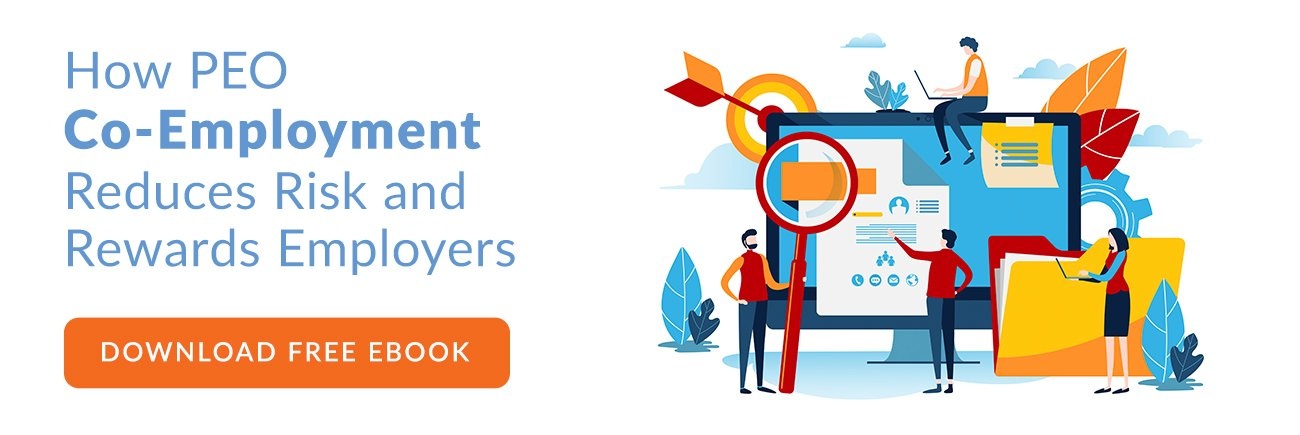When it comes to HR, no two organizations are alike. A small business with 50 employees will have entirely different needs than a larger organization with 250+ plus staffers, particularly if they're spread across several states.
The size of your business impacts the rationale for partnering with a Professional Employer Organization (PEO). Below are three categories that your company may fall under.
PEO for Small Businesses (50 Employees or Less)
Entrepreneurs and small business owners need to focus on the core aspects of their business. Whether that means seeking RFQs or focusing on conversion rates, small business owners have enough responsibility on their plates already.
The beauty of PEOs for smaller businesses is that they help small business management stay on top of key tasks.
- No more worrying about changes in state legislation that could affect your payroll taxes, no more grueling hours of data entry and payroll tax calculations. What a relief it is to leave payroll and payroll taxes to the professionals!
- PEOs also offer Fortune-500 level healthcare and insurance plans that are out of the realms of those plans offered for small groups.
- That's because PEOs use the bargaining power of experienced negotiators, on behalf of thousands of employees at a time to create a PEO masterplan.
Beyond the traditional benefits like medical insurance, dental insurance, group life insurance, and retirement plans, PEOs help business owners with a host of other benefits, even for the smallest entities.
If your organization is a small fish in a big, competitive pond, you'll appreciate the extra hours you can now spend meeting with prospects face to face, building your employer brand, or working on your website and content marketing plan in person.
PEO for Medium-Sized Businesses (50 to 250 Employees)
As your organization grew, you diversified the talent in your pool. Instead of a single computer-savvy employee, you've got a crew of them. Perhaps you've invested in an entire marketing department and a handful of outside sales reps. Maybe your glass-installation "guy or gal" is now an entire glass crew. Congratulations! Your success has been hard-earned.
Still, with that growth comes increased risks. Perhaps Human Resources is spending too many hours chasing certifications or other compliance issues. Instead of one full-time HR professional, you'd discovered that you need at least three or four HR pros on the team. This is where PEOs bring significant returns. From lowering your HR investments to monitoring key compliance issues, PEOs are designed to lift those burdens.
Plus, they bring state-of-the-art software that makes payroll, payroll taxes, and paystub management a breeze!
PEO for Larger Businesses (250+ Employees)
Once an organization reaches this size, the cost of HR professionals handling payroll alone is the same as a PEO — that's before you even consider the benefits of better healthcare plans, compliance considerations, and all the other benefits of a PEO.
To put it another way, for the same cost of an HR team, you'll get all the additional benefits that make your company a preferred employer among the most talented recruits.
Your HR department will be thankful too. At this level, there's a good chance you've got an unemployment file that needs to be managed. Perhaps you've had workers comp claims or disability issues. PEOs can help!
For many supervisors, it becomes a question of the HR workload.
- Would you rather have your HR team calculating payroll and vacation, or dedicating their shifts to the tasks that make your business a premier place to work?
- By using a PEO, you free up your HR staff to focus more on other issues like high-quality training opportunities, staff selection, or education and advancement topics for your employees.
Furthermore, know that compliance challenges grow as your company does. All it takes is one questionable HR temp to destroy the employer branding you've been working so hard to promote by misclassifying an employee or forgetting to record income tax withholdings.
If your business has been growing into satellite offices in other states, the payroll headaches and compliance risks grow exponentially with every new state you tackle. Your New York HR crew might have a solid grip on NY employment law, but do they know how it works in Nevada? Even if they're confident that they know the laws, is it ever worth risking that they don't?
Ultimately, every organization faces unique challenges as they grow. From the first headaches of payroll taxes to creating a benefits plan that will attract the best talent, PEOs provide valuable services and secure software.
When it comes to the value of a PEO to your specific organization, know that payroll and paystub recordkeeping is only the beginning. PEOs help smaller businesses navigate the waters of medical insurance and life insurance buys, and for the largest companies, they make contractor compliance a breeze. The value you get from a PEO will depend on your unique needs, your location(s), and the HR staff you have at hand already.



